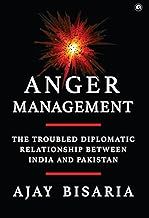
Anger Management: The Troubled Diplomatic Relationship between India and Pakistan
On 7 August 2019, High Commissioner Ajay Bisaria was expelled from Islamabad, the first time an Indian head of mission had been asked to leave by Pakistan. His expulsion marked yet another low in the troubled relationship between the two neighbours who had been born within a day of each other in 1947. The latest diplomatic row followed the dismantling of Article 370 in the erstwhile state of Jammu & Kashmir, but the hostility had been ratcheting up for a while, with the Pakistani terror attack in Pulwama, followed by the Indian airstrikes on terrorists in Balakot, and the grandstanding Pakistan engaged in over the return of a captured Indian Air Force pilot, Abhinandan Varthaman. This book looks in eye-opening detail at all these incidents that took place while the author was India's top diplomat in Pakistan, including blunders by Imran Khan, the then Pakistani prime minister, and parleys engaged in by the powerful head of the Pakistani army, General Qamar Bajwa. He also describes his interactions with Prime Minister Narendra Modi, External Affairs Minister Sushma Swaraj, and key members of the Indian establishment as they dealt with the multiple crises that took place during that time.
After providing readers with a gripping account of the events he was witness to, the author goes deep into the conflict and tension that have characterized the connection between the countries. He looks at this fractious history from a unique perspective, that of Indian diplomats who have served in Pakistan from Independence onwards. These were the people responsible for managing the situation on the ground, even as the actions of prime ministers, presidents, and generals made the news headlines. India's envoys were expected to deal with all manner of occurrences from routine matters to rather more taxing things such as dealing with dictators, engaging in backchannel talks with their counterparts and other Pakistani officials (accounts of which have only recently been declassified) when ties were strained, dodging spies, and even on occasion having to endure verbal and physical abuse from thugs and the Pakistani intelligence services. Equally, for all the stresses they had to endure, the warmth and friendship they received from ordinary Pakistanis made many of them hope that one day the cantankerousness and bloodshed that blighted Indo-Pak ties would be replaced by normalcy, if not enduring bonds of warmth and amity.
The stories about what these diplomats were able to do during their time in Pakistan provide the reader with fresh insights into most of the pivotal moments in the relationship-especially Partition, the 1948 Pakistani offensive that was stopped in its tracks by the prompt action of Prime Minister Jawaharlal Nehru, and the even bigger wars of 1965 (ably handled by Prime Minister Lal Bahadur Shastri), 1971 (in which Prime Minister Indira Gandhi won a resounding victory), and 1999 (where the Pakistani intruders were repulsed by Prime Minister Atal Bihari Vajpayee's decisive leadership). The book throws fresh light on terrorism in Kashmir, the skirmishes across the Line of Control, the attacks by Pakistani terrorists in Mumbai, and the assault on the Indian parliament. Further, the book covers the few initiatives that sought to resolve the perennial state of strife and suspicion between the neighbours-the Simla Accord of July 1972, Vajpayee's historic bus journey to Lahore in 1999, the Agra Summit of 2001, and other short-lived attempts to make new beginnings. Besides his in-depth analysis of history and current events, the author offers a reasoned plan of how India and Pakistan might be able to arrive at a lasting peace.
Masterfully blending scholarship, telling revelations, memoir, and history, Anger Management is a remarkable study of the diplomatic engagement between India and Pakistan.
Shipping Policy
1 Products will be shipped within 2-3 working days of receiving the order.
2. We ship within India free of charge. For international orders, we can quote customised rates.
Refund Policy
1 We offer refunds for products purchased from us or our eCommerce partner that are damaged or defective.
2 If you receive a damaged or defective product, please contact us within 48 hours of receiving the product to initiate a refund.
3 We may require proof of the damage or defect before processing a refund.
4 Refunds will be processed within 7 business days.
Cancellation Policy
1 Orders may be cancelled within 24 hours of placing the order.
2 Once an order has been shipped, it cannot be cancelled.
3 If you wish to cancel an order, please contact us as soon as possible.
Terms and Conditions
Any disputes regarding orders will be subject to Chandigarh's jurisdiction.
Privacy Policy
1 The Browser is committed to protecting users' privacy. We collect only the following personal information from our users-- Name, Mailing Address, Phone, Email, Billing Information and Address. We do not collect financial information like credit card data which is directly handled by the payment gateways.
2 We automatically collect data on how our users enter faujidays.com, such as your IP address, location, browser, operating system, device identifiers and cookies. You may disable cookies in your web browser.
3 We only use your personal information to help you utilise everything faujidays.com and The Browser have to offer.
4 We may share your information with our shipping and service partners.
5 While we do our best to keep your information safe and secure, please understand that you are providing your personal information at your own risk.
About Us
We are a bookstore and publishing house based in Chandigarh, India, in operation since 1997. We specialise in military books and have published over 40 titles to date.
Contact Us
SCO 14-15, Sector 8-C, Chandigarh
(Phone number and email in the footer)
